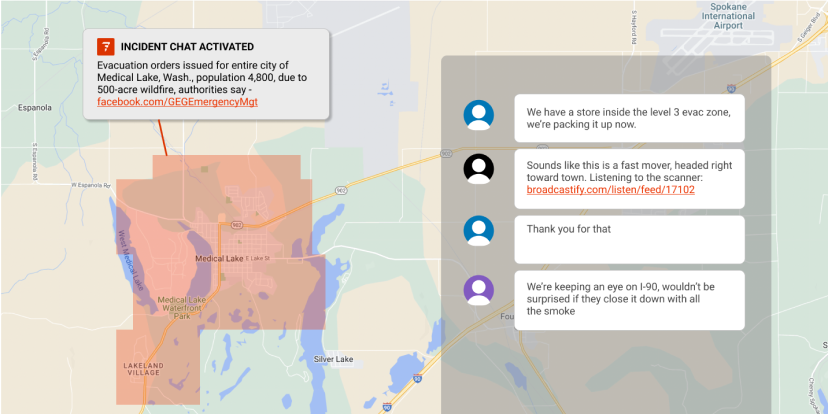When Factal launched several years ago, we created a chat channel for security and resilience teams to engage with our editors on duty. As our membership grew, the experimental feature became a breakout hit. Members have asked thousands of questions about global incidents, shared countless tips and flagged a few corrections, too. Explains one Factal member, “It’s worth its weight in gold.”
The power of collaboration has made Factal and our members better than ever, but why stop there? If security and resilience teams can chat with our editors, why can’t they chat with each other when their organizations are in proximity to the same critical incident?
For example, if a wildfire is burning toward a retail center, why can’t those companies securely share information with each other? Or if a hurricane is headed their way? Or if there’s an active shooting in an office park? Organizations could better assess what’s happening, gut-check emergency plans, unify responses and even pool resources to protect employees and customers.
“It would be a huge step forward for emergency and crisis management teams to be able to share during large-scale events, versus post-event knowledge-sharing of how things were handled by specific organizations,” wrote Ashley Goosman, founder of Disaster Empire.
Introducing Incident Chat
We’re very excited to announce Incident Chat, a groundbreaking new feature that extends the power of collaboration to organizations impacted by the same critical event. Here’s how it works:
In the early stages of a larger-scale event, organizations in proximity to the incident are notified to join a temporary chat on Factal.com and the Factal app. The secure channel is anonymous by default, private to Factal members and the Chatham House rule is in effect. Members can ask how other companies are responding, share critical details, offer resources and provide context.
Incident chat appears alongside Factal’s verified coverage – and editors are still available for questions – providing an unprecedented view into the event as it evolves. Not only can you see what’s happening and how it may impact your company, but you can chat with other companies responding to the same incident in real time.
Cross-company collaboration as a new duty of care
Sharing threat information between companies is not a new practice. Cybersecurity teams have collaborated through established channels for years. While cyber threats often pose a risk to companies in the same industry, physical threats are based on proximity. Without an established network, physical security teams have relied on ad hoc communication – their own informal contacts – to collaborate during real-time incidents.
“The criticality of collaboration between organizations during major disasters and security events including hurricanes, forest fires, and political upheaval cannot be understated,” said Meredith Wilson, CEO of Emergent Risk International. “With the right connections in place, there is an opportunity to share resources, share information, and most importantly, join forces to ensure safer and healthier outcomes for everyone involved.”
The growing speed and scale of climate events – along with everything else that’s happening – brings new urgency to collaboration efforts. As teams do more with less, it’s often a matter of bandwidth.
“During a crisis, those intelligence teams which collaborate and share with one another tend to outperform those that don’t,” explained Lewis Sage-Passant, PhD, Global Head of Intelligence, Novo Nordisk. “This cooperative approach has (at times) allowed private sector teams to radically outperform even their much better-resourced government counterparts, and is the single most important attribute of our field.”
Performance often translates into saved lives, not to mention lower costs, reduced downtime, happier employees and a more resilient company overall.
Companies and NGOs working together
While many of the largest Global 1000 companies are Factal members, the platform is also home to more than 250 disaster response and humanitarian aid NGOs like Team Rubicon, Direct Relief and World Central Kitchen. As part of our mission, NGOs have free unlimited Factal access. That includes access to Incident Chat and the popular Factal mobile app, which is opened in more than 100 countries every week.
We’re particularly excited to see how companies and NGOs will work together, especially in the rescue and recovery phase of severe weather and other natural disasters. Stay tuned!
Learn more about joining the Factal community
Incident chat is now live when larger-scale incidents are underway. Access to Factal’s chat community is limited to security, safety and resilience teams at companies and NGOs. Please contact us for a personalized demo, learn more about participation in your industry and see if you qualify for access.
For press inquiries, please contact tyler@factal.com.

